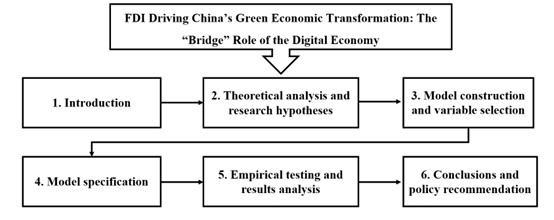
China’s economy has shifted from high-speed growth to high-quality development, with Foreign Direct Investment (FDI) playing a key role through the transfer of advanced technology and management expertise. This study constructs a three-tier evaluation system to assess high-quality green economic transformation and digital economy development at the provincial level from 2012 to 2023. Using panel entropy methods, 2SLS, and System GMM regression models, the study evaluates the dynamic effects of FDI. An IV-based causal mediation model further explores the digital economy’s mediating role. Results show that current-period FDI significantly promotes high-quality green economic transformation, whereas lagged FDI has a negative impact. The digital economy mediates the relationship between FDI and green economic transformation, though this effect is regionally heterogeneous. In the eastern region, both total and indirect effects are negative; in central and western regions, only direct effects are significant. In the northeast, the mediating role of the digital economy is not evident. A threshold model reveals that the digital economy exhibits a single threshold effect—only when digital development surpasses this threshold does FDI’s positive impact on transformation significantly increase. This suggests China’s digital economy has not yet reached a maturity level sufficient to fully leverage FDI benefits.
Total file downloads: 54